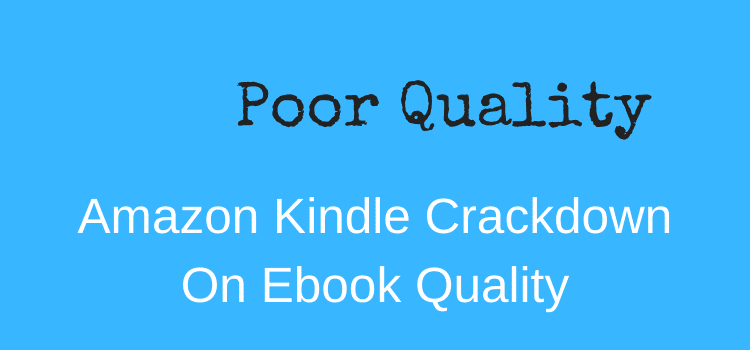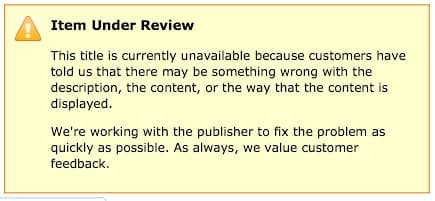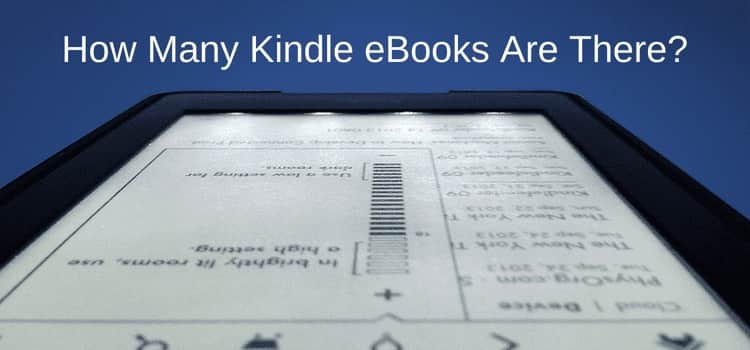
Amazon has implemented a policy that alerts publishers and readers when the Kindle ebook quality on Kindle Direct Publishing (KDP) is below standard.
Authors and publishers who ignore sub-standard quality issues may face negative consequences.
Hopefully, this move will lessen the number of Kindle scams that have no place in self-publishing.
A range of warning messages can now appear on an ebook’s sales page on the Kindle Store.
Amazon’s Kindle quality guide
The warnings highlight very clearly that the ebook files have content issues.
Also, quality concerns that Kindle ebook buyers raise can lead to an ebook sales page carrying a quality warning.
Amazon’s Kindle Direct Publishing has a help page on the topic, Guide to Kindle Content Quality.
It gives full details about all issues concerning ebook quality.
However, this short excerpt clearly states that there are two possible results from publishing sub-standard ebooks.
The combined impact on the reading experience of a book with excessive Distracting or Destructive Issues can lead to the book being removed from sale until the corrections are made.
A moderate amount of Distracting or Destructive Issues can result in the book remaining available for sale, but with a temporary quality warning displayed on the detail page of the book on Amazon.com until corrections are made.

The penalty for poor ebook quality is the possible addition of a warning message on a book’s sales page.
A notice such as the one above will certainly stop book sales.
An ebook can be removed
If the publisher doesn’t address the issues, KDP may remove the ebook from sale and add notices as per the examples below on the sales page.


Of course, each of these notices will stop sales in an instant, and no author in their right mind would want them.
Not only do these warnings dissuade ebook buyers but also buyers of print books.
If the ebook version is full of errors, there is no doubt that the paperback will be equally as bad.
Amazon highlights poor-quality ebooks
I think this crackdown by Amazon is well and truly overdue.
Most hard-working self-publishing authors will wholeheartedly welcome the initiative. It can only help reduce the number of Kindle scam publishers.
Critics of self-publishing have used examples of the very worst self-publishing can offer. It then tarred all self-publishers with the same brush.
Amazon’s action, then, in taking a strong position to remove the trash, is a huge and positive step forward.
Some authors ignore the quite lenient KDP spellchecking system suggestions at the time of publication.
But now, there are consequences for not fixing the issues.
Sadly though, this new warning program is only available on amazon.com at present.
One can only hope that Amazon will roll this feature out on all their Kindle Stores as quickly as possible.
How to report poor Kindle ebook quality
It is not a pleasant thing to have to do.
But sometimes, you may want to report an ebook that disappoints you.
It could be because of poor formatting issues, grammatical errors, or lots of careless typos.
If you wish to, you need to go toward the bottom of the page to the feedback box to report an issue.

Once you click the link, you can then complete a form with the details of the issues you have experienced.
As ebooks can display in various ways on different devices, you should, in fairness, note your device in your submission.
Related Reading: Can You Sell Books With No Words On Amazon KDP?
Share This Article



I have now had to edit most of my novels for typos (ten or twelve usually) thanks to the efforts of the reading police. One wonders if they actually enjoyed the story or if they’re like the folk that say I cheated with the clues (they are crime mysteries) or only seem to take pleasure in carping: “this is not the language used by writers of the 1920s” (not enough thee, thou and gadzooks, obviously). However, they do occasionally pick up some egregious howlers that slipped past both the author and his editor (wife) and I usually find something they’ve missed or that might be better expressed. All in all, I’ve come to see it as a Good Thing. (Unless I’ve lost the file. Then, not so much).
I often have dialect in my (eleven) historical novels. I hate to think what’ll happen if my troll (I know who you are, dear) cottons on to this. As someone else has said, you sell thousands of copies and get picked up by a single tiresome reader for just a couple of measly typos (one of which isn’t). Pulling up the manuscript, looking for and changing the damn thing and republishing all takes valuable writing time. Plus, — especially! — the nail-biting worry that something will go wrong. And suppose you no longer have the manuscript? Stuffed!
I wondered how long it would take to have such action, and I welcome it. I’ve downloaded some awful offerings that were completely unreadable,
However, I have also published, and got a troll determined to do down my book, a troll other authors were suffering from. I have to say that I had duly checked my book, and sent it to two different editors, who combed it before I rechecked and published. We still all missed a typo on the first page. (which I subsequently corrected.) What do Amazon do about trolls and vexatious complainants? Do they check to see if there is substance to the complaint? Would a couple of typos really bring down their dreaded yellow veil? or are they looking for a more sustained set of mistakes?
I write paranormal with a lot of Latin. I get spell check warnings all the time for Latin words this is going to be a night mare with Amazon’s track record with KDP non-support.
The spellchecker plays absolutely NO part in the quality Crackdown. You have to have readers complaining about mistakes, not some list of errata from the automated spellchecker. As this has been in place for two years now, if you haven’t been whacked yet, you probably shan’t be.
In the history of law, with so many latin maxims, and german principles, is difficult to have a grammar supervision for ebooks on law.
My copy of my Antonia by willa cather has become unintelligable
I read a lot of books on my Kindle, and the Kindle ipad app. I find it really distracting from the story when I find errors in the books.
Thanks for putting together a guide on how to report the errors properly.
I just saw the ‘quality issue’ alert for the first time on Amazon Canada today so it’s being used and I recently received an e-mail from Amazon stating a book I had purchased had an update available after being edited.
It’s the readers that are the reporters. if you have an eInk Kindle, particularly, it’s simplicity itself to highlight a word, phrase, etc., and report it as being erroneous. You can select any number of areas of errata–typo, punctuation mistake, grammar, even plot holes.
I’ve made extensive use of it for older, backlisted books that were out of print, like the Perry Masons, which were brought into Kindle via scanning. Some of them are rife with quality errors–tons of scan mistakes, some with 3-4 mistakes per screen, making it miserable to read.
Anyway, that’s who is reporting the errors. The reporting mechanism tells you that a Kindle Quality Specialist will look into it–but I don’t know how well that works. I know that one of the Perry masons that I reported, that was particularly egregious, had reviewer comments from over a year earlier about typos–so apparently, some publishers choose to ignore the reports, and for some mysterious reason, no KQN seems to be issued, and no warning to the buying public, either.
The feedback link is only on desktop site.
Hopefully syntax won’t be an issue. Stories are forms of creative writing. Sure there are the proper uses of syntax, like where commas go and such, but then there’s the example of, “Mary! Get back to your room!”, comma after the exclamation mark then close-parentheses sequence–to which I say is fine. It’s not a college paper after all.
We live in strange times where creativity is slowly becoming a stricter production.
I have long been becoming more perturbed by the perpetuation of the idea that bad syntax, grammar, punctuation and unwarranted misspellings play any role in the creativity of a piece. Bad syntax or misspellings are fine when, for example, they are part of the dialogue, and whose goal is to show something about that character. It’s narration that shouldn’t contain them, yet, that is where I see it most. Creativity is really not becoming a stricter production; syntax, punctuation, and grammar etc. give communication the structure that it needs for the author to be understood by their readers. If your story is not only good, but also reads fluently, then your reader base will grow.
Stories are not a form of creative writing. They ARE creative writing. Saying, “It’s not a college paper after all,” is like saying, “Who cares about my readers? They’re all stupid anyway.” They’re these ideas that are responsible for authors presently spending 10% of their time writing and 90% of their time pushing their ebook. Meanwhile, many polished authors’ works are buried beneath a heaving sea of sophomoric, unedited manuscripts that read only slightly better than an engrish translation of the ingredient list on a package of Twinkies.
Good writing is fluid and understandable without effort, and your readers will thank you by giving you the money you want and deserve.
I got a ‘quality’ flag for 6 typos. Six.
I also got ‘missing content’ because one of those typos was the word ‘to’ missing.
Think about that, a book with over 500 reviews, 80 percent of which are 5 star, a book which has been winning monetary awards from amazon because of its high sales (over 40K copies so far), got a flag for ‘missing content’ because of a typo.
What I want to know is just who is reporting these typos? I got flagged on one book because someone didn’t know what a word meant. It was the right word, they just didn’t know what it meant, so they flagged it.
I’m all for fixing typos. I tell my fans to send them to me, so I can fix them. Because no matter what you do, they will always slip through. Even paid editors can’t find them all it seems. But to flag a book for 6 typos? And then to take days to pull the flag down after I fixed them (it’s been three days now).
I think Amazon has a few of it’s own issues that it should be addressing.
I find more than six typos in EVERY book I read by a Big Five author. I’m a huge CJ Box fan, and I’m always finding multiple errors in his books, some of which have been reprinted many times. It happens. There’s no such thing as an error-free book, and there’s no such thing as a perfect editor. We only hope that our teams can get the manuscript as perfect as possible before it’s released, but we’re all human and miss things, even the big dogs. So, does this “crackdown” only apply to self-published authors, or will the Big Five authors also be held accountable? I’ve yet to see a quality notice on a Big Five book, and I know for a fact that some of them have more than the six typos that got you flagged.
Over the last few years, I’ve gotten a few quality issues here and there. For the most part, like you, I appreciate the heads up. However, what I don’t appreciate is some reader relentlessly flagging a statement in dialogue that is true to the setting (I should know, I’ve lived there my entire life), and Amazon continuing to send me these same quality notices. In one case, Amazon repeatedly kicked back my “this is not an error” response and my explanation that it was a piece of true-to-life dialogue. I had to contact a live person and have them intervene to get the quality notice lifted.
Currently, I’m stuck in review because someone thinks I should’ve written “as open-and-shut a case as they had ever seen,” when I actually wrote (and MEANT to write), “as open-and-shut a case as any had ever been,” and Amazon refuses to accept my “this is not an error” response. Who has time for this nonsense? If Amazon is going to start automatically accepting any and all flags by some random person (someone who may or may not be acting in good faith), then they’d better start automatically accepting the word of the authors who review a suggestion and say it’s not an error.
I’m not sure, but I think the application of AI checking by Amazon is only used for KDP self-published titles. If you use Grammarly, you’ll know that AI is far from perfect. That’s probably why KDP is flagging your phrase. But it is difficult to get through to a human at Amazon to rectify a problem such as this. Everything at Amazon now seems to be automated to the extreme. All I can do is wish you good luck in finding a solution.
So…if these error reports are based solely on readers (who may not have had better training than authors and editors th)….than who is to stop people from using this as a way to bully people?
Yes. I think it is more common than you think. Invariably through envy or maybe just nastiness. If you write something that is interesting you will have your critics no matter what. Jealousy is rife when it comes to creative writing.
Graham Cameron
What do you think of this idea?
Imagine during the process to self-pub at Amazon, you upload your text and it runs something like Auto-Crit/Grammarly/ProWritingAid on it. If it scores above a certain threshold for issues, they yell at the user and refuse to accept it.
Obviously, somebody might quibble over what gets flagged, but let’s pretend the tool is decent at finding gross errors most editors would agree upon.
Would that be a helpful addition?
Considering that to date, no one, and I mean NO ONE has written a grammar checker that actually works on the English language, no, it won’t work.
I own two of the better grammar checkers and push stuff through them constantly. And they fail, constantly.
I love the idea of this, but i hope it doesn’t backfire. When you write fiction, there are often words that are misspelled on purpose, to signify dialects. Same goes for grammar. And sometimes i make up a word to use for certain sounds like “Her crepe soles squitched across the floor”—I hope they can tell the difference.
Maybe all authors of any category of book should always aim for quality not quantity. Everyone would like to hit the ‘big time’ but churning out books every few books won’t achieve this.
Considering I once read a kindle book from a big name and big publisher in which two people “linked anus” instead of “linked arms,” and they couldn’t decide between kilometers and miles, changing every few pages, I really hope this does not simply target self published books like you seem to suggest. I would hope it targets ALL the rubbish, no matter where it comes from.
I see errors in almost all books now, Mcky. Books are rushed out so quickly and quality has definitely fallen.
And that includes best selling authors … and their editors.
This is the sort of thing that makes me feel that indies have a unique opportunity to build a reputation for having fantastic quality. When the “big boys” are treating publishing the way Wal-Mart treats knick-knacks, it creates a hole in the market that indies are uniquely equipped to fill.
Well said. Thank you, McKy.
I got a “Kindle Quality Assurance” email — they wanted the phrase “Go check it out” spelled “Go cheque it out.” I explained I write in English, but I’m not British and “check” doesn’t have a “q”. Go figure. I hope they hire better help.
Well someone evidently has no idea that the British ‘cheque’ refers to the now archaic payment slip. Check, as in affirm/confirm/ensure, etc., is spelt check in every English variant.
And, yes, spelt is a British-English variation of spelled.
You mean spelled is a variation on the original English.
I always find it hilarious when someone reviews my book and adds a list of typos they found which includes:
colour vs color
do’na vs don’t
dair vs there
eegit vs idiot
windea vs window
and for some reason they never catch
bahookie vs bum
clookie vs chicken
they also fail to notice the big bold letters on the first page noting:
“The author of this book is Scottish; This book is written in Scots English”
Cheques are not archaic volunteer with a charity shopping for old people and we get cheques all the time.
In UK English it only has a q if it’s in reference to money. That spell checker missed the context as well.
check doesn’t have a ‘q’ in British English in this context – check would be correct. A cheque is a bank document you can use to pay an amount of money.
Wish it were true, but it appears to be a hoax perpetrated by wishful thinking and blog propogation .
Their, there! (end of 2nd line, 3rd para.)
Well spotted!